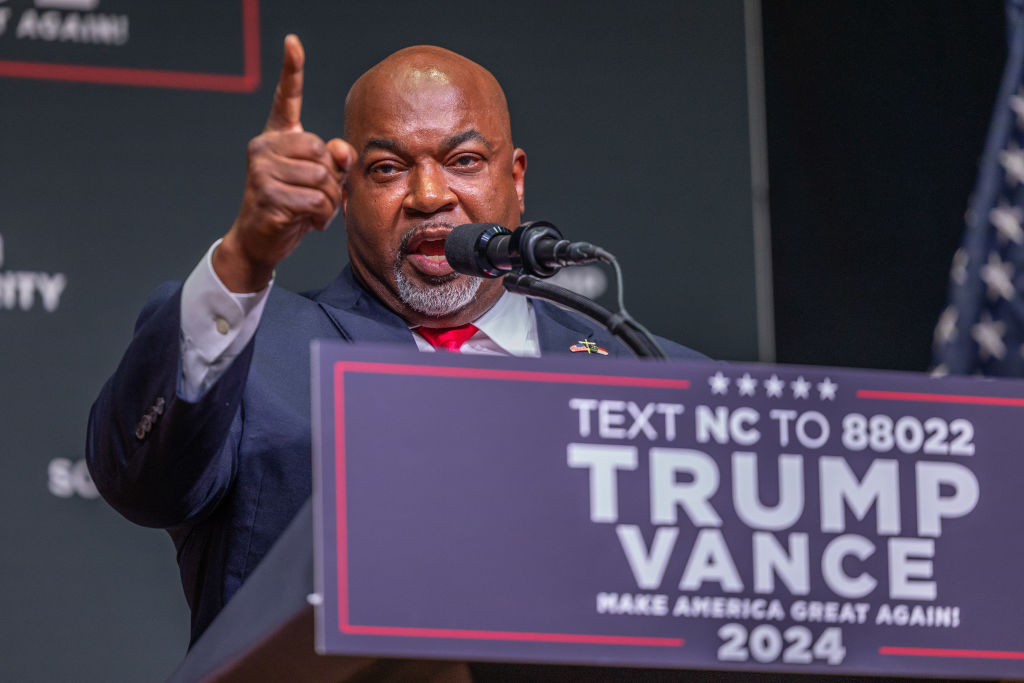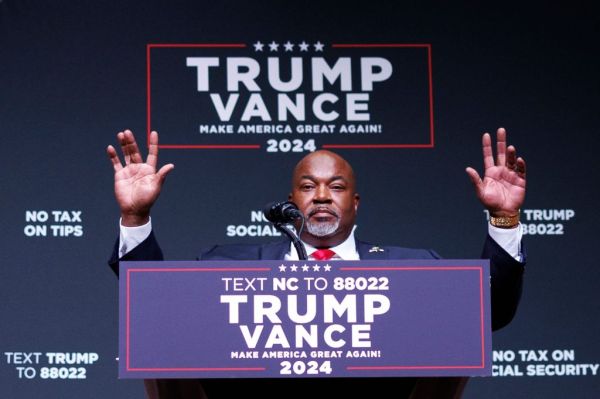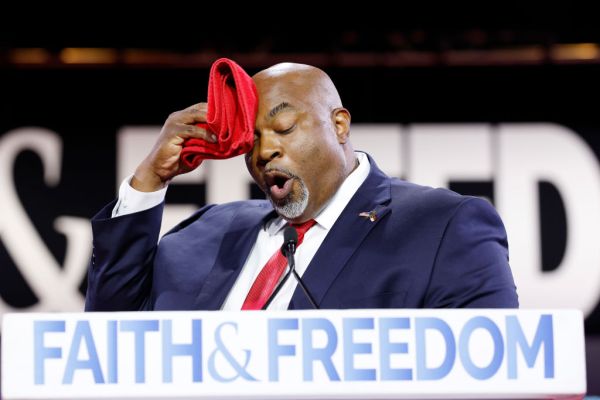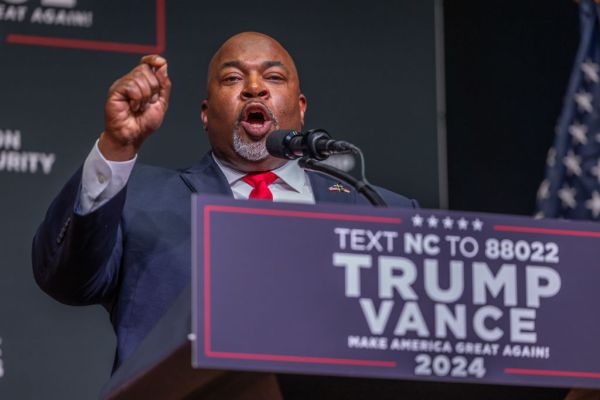A bombshell report from CNN about North Carolina Lt. Gov. Mark Robinson, the Republican nominee for governor, didn’t exactly upend the race—Robinson was trailing significantly even before the story broke—but the details were nonetheless shocking, even considering Robinson’s history of making controversial remarks. CNN reported that Robinson made comments on a pornographic website from 2009 to 2012 in which he declared himself a “black Nazi,” said he’d “take Hitler” over anyone in Washington, admitted to peeping on women in high school, and expressed both his support for slavery and desire to purchase slaves if it were legal.
What’s not shocking is why someone like Robinson was able to get to such a position in the first place: State Republicans simply chose not to stop him.
A non-traditional politician.
Like many Trump-era politicians, Robinson comes from a nontraditional political background. Robinson grew up in Greensboro, North Carolina, a midsized city near the state’s geographic center. As Robinson recounts it, he and his nine siblings dealt with an abusive father and spent time in foster care. They would later be returned to their mother’s custody. Robinson credited his mother’s devout Christian faith with inspiring his own. In speeches, he often sounds more like a Baptist country pastor than a politician.
After high school, Robinson spent time in the Army Reserves and furniture manufacturing. He married his wife Yolanda in 1980. In 2018, Robinson delivered a speech in support of gun rights at the Greensboro City Council that went viral after then-U.S. Rep. Mark Walker shared it. Within a week, the then-unknown Robinson’s speech had been viewed by more than 3 million people.
That burst of attention prompted Robinson to pivot heavily to politics. He became a frequent speaker at conservative events and a board member of the National Rifle Association. Even still, when he announced a run for lieutenant governor in 2019, he did so to little fanfare. But despite being heavily outraised by a field with eight other Republicans—including the incumbent state superintendent of public instruction and a former congresswoman—Robinson won the primary with 32.5 percent of the vote, almost 20 points ahead of the next-closest finisher.
The campaign.
Initially, state Republicans were excited about the relatively unknown Robinson. His compelling personal backstory, strong ties to and support in evangelical churches, and potential to be the state’s first black lieutenant governor led him to be seen as a potential rising star.
Then news outlets began looking more closely into his past. In September 2020, Travis Fain of WRAL, the NBC affiliate in Raleigh, reported on a slew of offensive and bigoted remarks Robinson had made on his Facebook page. Robinson had, at various points, criticized black people for giving “shekels” to Jewish figures in Hollywood, claimed that Michelle Obama was a man, and warned that acceptance of homosexuality was a slippery slope toward pedophilia. Later reporting from the News & Observer found that Robinson declared “transgenderism” to be a “mass delusion,” bemoaned Muslim immigrants as “invaders,” and used a Yiddish slur.
“At any point, elected Republicans could have stepped in and opposed Robinson publicly. Instead, they stood by as he was elected in 2020, stayed silent as he served as lieutenant governor, and preemptively surrendered when he announced a run for governor.”
Robinson generally stood by his remarks, and the North Carolina Republican Party refused to comment on the matter. The race itself also drew national investment from an unrelated front: Michael Bloomberg’s Beyond Carbon Victory Fund spent more than $2.5 million supporting Robinson’s opponent, Democrat Yvonne Holley. Despite all of this, Robinson would end up winning by a margin of around 3 percent, greater than Donald Trump’s margin of victory in the state. State Republicans had managed to win, but in the process they had put Robinson in a stepping-stone office for governor.
A tumultuous tenure as lieutenant governor.
As lieutenant governor, Robinson faced several major hurdles, the first being the nature of the office. Long an important role, most of the office’s powers were stripped by the General Assembly in 1989. The office of lieutenant governor has since become little more than a figurehead. Robinson’s powers consist primarily of membership on a handful of boards, like the State Board of Education, and the ability to act as governor when the governor is out of state.
North Carolina elects its governor and lieutenant governors separately, and Robinson’s relationship with Democratic Gov. Roy Cooper has been nonexistent. Unlike previous governors, Cooper has eschewed notifying the lieutenant governor when he’s out of state. Cooper feared that Robinson would abuse any time spent as acting governor. Using what little influence he does have as lieutenant governor, Robinson has focused mostly on education. He also focused on socially conservative priorities, supporting a total ban on abortion (a stance he’s since reversed) and opposing LGBT rights, especially transgender rights.
Robinson has faced continual scrutiny over his personal life. His financial history includes three personal bankruptcies, hundreds of dollars in unpaid taxes, and missing seven years of income tax filings. In 2022, Robinson admitted that he had once paid for an abortion. Robinson has added to the fire with increasingly controversial statements; among other things, he denounced homosexuality as “filth” and suggested in a speech at a church that society should be “led by men.”
A disastrous run for governor.
In April 2023, Robinson announced his gubernatorial campaign. That Robinson was ultimately aiming to run for governor wasn’t a surprise; what was a surprise, however, was how the state Republican establishment immediately lined up behind him. Robinson was flanked by Republican legislators—including state Sen. Phil Berger, perhaps the most powerful Republican in North Carolina. Berger justified his appearance by touting Robinson’s support of the legislature’s priorities.
Support from a prominent establishment figure like Berger effectively signaled that Robinson had the party’s blessing. His most notable primary opponent—Mark Walker, the same man who first shared the speech that made Robinson a star—dropped out of the race in October 2023, leaving only incumbent treasurer Dale Folwell and businessman Bob Graham as opponents. Robinson defeated both in the primary, securing around two-thirds of the vote. Folwell opted not to endorse Robinson afterward, and he has since condemned Robinson for “fleecing” Republican donors.
Early polls indicated Robinson held a slight edge over Democratic nominee Josh Stein, the state’s attorney general. But as the campaign has dragged on, Robinson has cratered, and his inflammatory statements have become more and more frequent. For example, at a speech at a church in June 2024, he told the audience that “some folks need killing.”
Robinson hasn’t led in a poll since July, and he trails by 11 points on average in the polling aggregator from The Hill/DDHQ. And now, the CNN report might have put the final nail in his campaign’s coffin.
Republicans could have stopped Robinson.
Robinson has denied the CNN report and rejected calls to drop out of the race, and the state Republican Party is publicly standing by him. However, the picture is a little different behind the scenes. According to Carolina Journal, a prominent conservative outlet in the state, Robinson faced immense pressure from state Republicans to drop out and is “not welcome” at Trump or Vance events. The deadline to drop out was September 19, the day the CNN report came out; most of Robinson’s campaign staff have since resigned. On Monday, the Republican Governors Association said it would stop buying ads on Robinson’s behalf.
At any point, elected Republicans could have stepped in and opposed Robinson publicly. Instead, they stood by as he was elected in 2020, stayed silent as he served as lieutenant governor, and preemptively surrendered when he announced a run for governor. Republicans could have taken his candidacy seriously before his run for lieutenant governor, and after he won the primary, they could have done the basic due diligence of candidate research before treating him like a rising star. They could have chosen to cut him loose in 2020 rather than allow him to reach an office that would set him up for a gubernatorial campaign. They could have disowned him for any of his controversial statements or actions as lieutenant governor. Instead, for half a decade, Republicans were more than happy to tolerate Robinson because they thought it would benefit them. But now, Democrat Josh Stein is almost certainly going to win the governorship.
Republicans control both chambers of the statehouse, and overall control of the legislature isn’t in play in November. They will be unlikely to get any bills past Stein’s gubernatorial veto without a supermajority. In order to win the 72 seats needed for a supermajority in the lower house, Republicans need to win at least one Biden district while holding a slew of left-trending districts in suburban Charlotte, Raleigh, Greensboro, and Winston-Salem. It’s hard to imagine a worse-suited candidate for such areas than Robinson. There’s also the possibility that Robinson might have “reverse coattails”—that is, he might perform so poorly that he drags Trump down as well.
Republicans haven’t lost North Carolina in a federal election since 2008, and with 16 electoral votes, it isn’t a state they can afford to lose. Without a supermajority, many of the legislative priorities the Republican establishment supports—like continued funding for the state’s school voucher program—will be in jeopardy. But the party can’t expect voters to turn a blind eye when it supports a bad actor like Robinson. When you’re standing behind and supporting a candidate known for inflammatory statements, bigoted remarks, financial indiscretion, and personal improprieties, the outcome is entirely predictable—and the North Carolina GOP has only itself to blame.









Please note that we at The Dispatch hold ourselves, our work, and our commenters to a higher standard than other places on the internet. We welcome comments that foster genuine debate or discussion—including comments critical of us or our work—but responses that include ad hominem attacks on fellow Dispatch members or are intended to stoke fear and anger may be moderated.
With your membership, you only have the ability to comment on The Morning Dispatch articles. Consider upgrading to join the conversation everywhere.